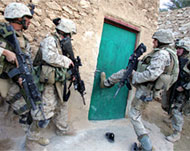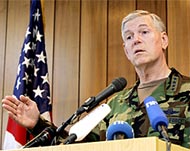Powell faults post-war US planning
Former US secretary of state Colin Powell has criticised US planning for post-invasion Iraq, saying more soldiers should have been on the ground in the aftermath of the war.

In an interview with Britain‘s Daily Telegraph newspaper published on Saturday, Powell said the war had been “brilliantly fought” with a limited number of soldiers but the steps taken towards “nation building” were insufficient.
There were “enough troops for war but not for peace, for establishing order”, he told the paper, which said the comments demonstrated a rift between Powell and US Defence Secretary Donald Rumsfeld.
Powell said: “My own preference would have been for more forces after the conflict.”
The number of US troops in Iraq was boosted to around 150,000 in advance of last month’s election, up from 123,000 a year ago. They are supported by about 26,000 foreign troops.
Post-invasion scenario
After the 2003 invasion, Rumsfeld said US military commanders thought there were enough troops to contain anti-US fighters and establish peace. However, amid escalating violence and to boost security for January’s Iraq elections, the troop levels were later increased.
Powell, who resigned from his post in November, said he had warned President George Bush in August 2002 about the problems of a post-war scenario.
 |
|
US troops in Iraq were boosted |
“My caution was that you need to understand the difficult bit will come afterwards – the military piece will be easy,” he said he had told the president.
“This place (Iraq) will crack like a crystal goblet, and it’ll be a problem to pick up the bits.”
Powell said it was for this reason that Bush gave him the go-ahead to embark on the ultimately unsuccessful effort to win a second United Nations resolution backing the war amid opposition from traditional US allies such as France.
European trip
It was an attempt to heal the bitter differences the war had caused that prompted Bush to embark this week on a fence-mending trip to Europe. Powell said the United States needed to do more to improve its European relations.
|
“This place (Iraq) will crack like a crystal goblet, and it’ll be a problem to pick up the bits” Colin Powell, former US secretary of state |
“We’ve got a lot more work to do with European public opinion,” he said, adding US policies and the language used to express them had grated with many Europeans.
He also distanced himself from the now famous remarks uttered by Rumsfeld in June 2003 when he described France and Germany as “old Europe” compared with a “new Europe” of US allies.
“I never used that phrase. It just wasn’t a useful construct,” he said. “It was just something that Don used one day and became chiselled in time.”
Ongoing fighting
Meanwhile, the United States‘ top military commander has said the fighting in Iraq is not likely to be put down in a year or two, since history shows such uprisings can last a decade or more.
 |
|
America’s top general believes |
Air Force General Richard Myers said on Friday that in the past century, uprisings around the world have lasted anywhere from seven to 12 years, making a quick fix to the problem in Iraq unlikely.
“This is not the kind of business that can be done in one year, two years probably,” Myers, chairman of the Joint Chiefs of Staff, said in a speech to the Los Angeles World Affairs Council.
Myers was filling in for Secretary of Defence Donald Rumsfeld, who was scheduled to address the group but became ill after a long trip to Europe.
Ink-stained fingers
Myers said that recent elections in Iraq were a sign that resistance groups were not succeeding in their efforts to strike fear in Iraqis.
US television was full of images in January of Iraqis whose fingers were stained with indelible ink after casting their ballots.
“They were sticking that ink-stained finger in the eye of the insurgents,” Myers said.
In Iraq, negotiations continued on Friday over who would lead the country’s new government, talks made more complicated by delicate ethnic and sectarian issues.
The new government is expected to make security an immediate focus.